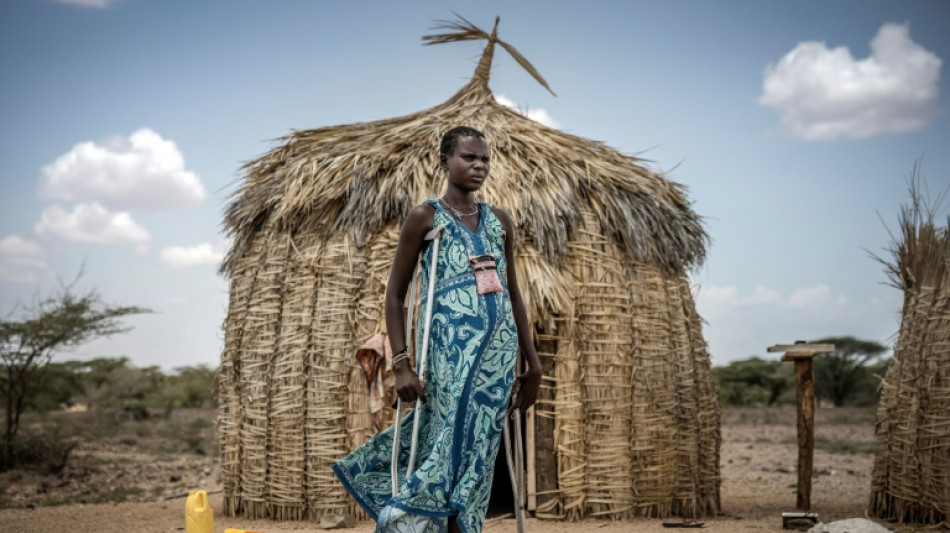
-
 Yesavage fairytale carries Blue Jays to World Series brink
Yesavage fairytale carries Blue Jays to World Series brink
-
Bank of Japan keeps interest rates unchanged

-
 Impoverished Filipinos forge a life among the tombstones
Impoverished Filipinos forge a life among the tombstones
-
Jokic posts fourth straight triple-double as Nuggets rout Pelicans

-
 UN calls for end to Sudan siege after mass hospital killings
UN calls for end to Sudan siege after mass hospital killings
-
Teenage Australian cricketer dies after being hit by ball

-
 As Russia advances on Kupiansk, Ukrainians fear second occupation
As Russia advances on Kupiansk, Ukrainians fear second occupation
-
Trade truce in balance as Trump meets 'tough negotiator' Xi

-
 China to send youngest astronaut, mice on space mission this week
China to send youngest astronaut, mice on space mission this week
-
Yesavage gem carries Blue Jays to brink of World Series as Dodgers downed

-
 With inflation under control, ECB to hold rates steady again
With inflation under control, ECB to hold rates steady again
-
Asia stocks muted with all eyes on Trump-Xi meeting

-
 Personal tipping points: Four people share their climate journeys
Personal tipping points: Four people share their climate journeys
-
Moto3 rider Dettwiler 'no longer critical' after crash: family

-
 US economy in the dark as government shutdown cuts off crucial data
US economy in the dark as government shutdown cuts off crucial data
-
Trump orders nuclear testing resumption ahead of Xi talks

-
 'Utter madness': NZ farmers agree dairy sale to French group
'Utter madness': NZ farmers agree dairy sale to French group
-
Samsung posts 32% profit rise on-year in third quarter

-
 30 years after cliffhanger vote, Quebec separatists voice hope for independence
30 years after cliffhanger vote, Quebec separatists voice hope for independence
-
Taxes, labor laws, pensions: what Milei wants to do next

-
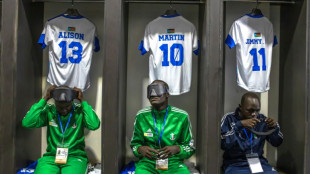 South Sudan's blind football team dreams of Paralympic glory
South Sudan's blind football team dreams of Paralympic glory
-
US says 4 killed in new strike on alleged Pacific drug boat

-
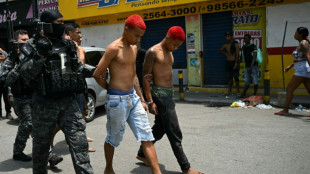 What we do and don't know about Rio's deadly police raid
What we do and don't know about Rio's deadly police raid
-
'They slit my son's throat' says mother of teen killed in Rio police raid
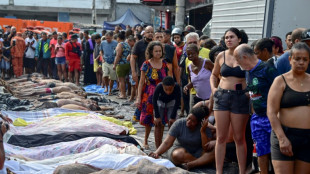
-
 Arteta hails 'special' Dowman after 15-year-old makes historic Arsenal start
Arteta hails 'special' Dowman after 15-year-old makes historic Arsenal start
-
Google parent Alphabet posts first $100 bn quarter as AI fuels growth

-
 Underwater 'human habitat' aims to allow researchers to make weeklong dives
Underwater 'human habitat' aims to allow researchers to make weeklong dives
-
Maresca slams Delap for 'stupid' red card in Chelsea win at Wolves

-
 'Non-interventionist' Trump flexes muscles in Latin America
'Non-interventionist' Trump flexes muscles in Latin America
-
Slot defends League Cup selection despite not meeting 'Liverpool standards'

-
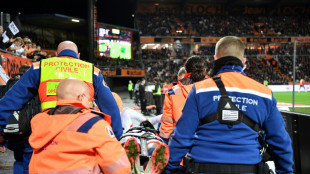 'Poor' PSG retain Ligue 1 lead despite stalemate and Doue injury
'Poor' PSG retain Ligue 1 lead despite stalemate and Doue injury
-
Liverpool crisis mounts after League Cup exit against Palace

-
 Kane scores twice as Bayern set European wins record
Kane scores twice as Bayern set European wins record
-
Radio Free Asia suspends operations after Trump cuts and shutdown

-
 Meta shares sink as $16 bn US tax charge tanks profit
Meta shares sink as $16 bn US tax charge tanks profit
-
Dollar rises after Fed chair says December rate cut not a given
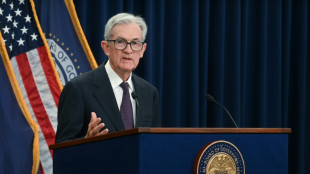
-
 Google parent Alphabet posts first $100 bn quarter as AI drives growth
Google parent Alphabet posts first $100 bn quarter as AI drives growth
-
Rob Jetten: ex-athlete setting the pace in Dutch politics

-
 Juve bounce back after Tudor sacking as Roma keep pace with leaders Napoli
Juve bounce back after Tudor sacking as Roma keep pace with leaders Napoli
-
Favorite Sovereignty scratched from Breeders' Cup Classic after fever

-
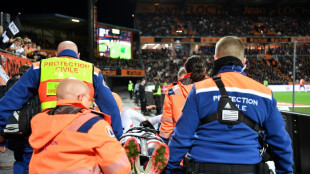 Doue injured as PSG held at Lorient in Ligue 1
Doue injured as PSG held at Lorient in Ligue 1
-
Leverkusen win late in German Cup, Stuttgart progress

-
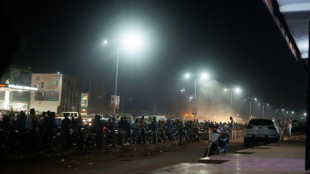 Jihadist fuel blockade makes life a struggle in Mali's capital
Jihadist fuel blockade makes life a struggle in Mali's capital
-
Uber plans San Francisco robotaxis in Waymo challenge

-
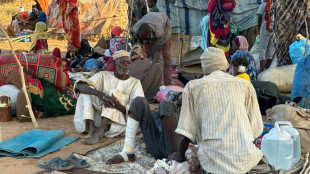 Paramilitary chief vows united Sudan as his forces are accused of mass killings
Paramilitary chief vows united Sudan as his forces are accused of mass killings
-
Trump, Xi to meet seeking truce in damaging trade war

-
 Divided US Fed backs second quarter-point rate cut of 2025
Divided US Fed backs second quarter-point rate cut of 2025
-
'Amazing' feeling for Rees-Zammit on Wales return after NFL adventure

-
 'Cruel' police raids help, not hinder, Rio's criminal gangs: expert
'Cruel' police raids help, not hinder, Rio's criminal gangs: expert
-
S. African president eyes better US tariff deal 'soon'
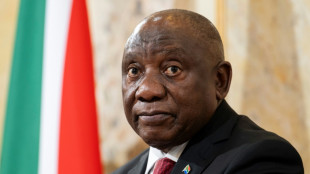

Rare bone-eroding disease ruining lives in Kenya's poorest county
Joyce Lokonyi sits on an upturned bucket, fingers weaving palm fronds as the wind pulls her dress to expose the stump of her amputated foot, lost to a little-known disease ravaging Kenya's poorest county.
Mycetoma is a fungal or bacterial infection that enters the body through any open wound, often as tiny as a thorn prick.
Starting as tiny bumps under the skin, it gradually leads to the erosion of tissue, muscles and bone.
The fungal variety is endemic across the so-called "mycetoma belt" -- including Somalia, Sudan, Yemen and northern Kenya -- with funding and research desperately lacking.
Once the disease has reached the bone the only option is amputation.
"I was able to slightly walk, although the disease had eaten all my toes," Lokonyi, 28, told AFP.
She was shunned by the local community, she said.
"They used to say that when you go to someone's home, you will leave traces of the disease where you stand."
She was unable to afford medication despite her husband selling off his goats, and amputation became the only option.
"I accepted because I saw that it was going to kill me," she said, a pair of battered crutches lying on the sand beside her two-year-old daughter.
But she has struggled with the aftermath.
"I have become a good-for-nothing, I can't work, I can't burn charcoal, I can't do anything," she said.
- Neglected -
In Kenya's poorest county, Turkana, around 70 percent of the population lives beneath the poverty line, with healthcare limited and hard to reach.
Mycetoma disproportionately affects rural communities of farmers and herders, according to the Drugs for Neglected Diseases initiative (DNDi), a global NGO.
It was only recognised as a neglected disease by the World Health Organization in 2016. Ignorance and misdiagnosis remain widespread.
"Doctors are not aware of the disease," Borna Nyaoke-Anoke, DNDi's head of mycetoma research, told AFP.
"If you're used to donkeys, you don't start seeing zebras everywhere."
The scale of the problem is difficult to estimate, but Ekiru Kidalio, director of Lodwar Hospital in Turkana, said they "rarely go a week without finding a case".
He added that the local population, 80 percent of which is illiterate, often turns to traditional medicine.
By the time they come to hospital "the condition is already advanced such that it's not easy to reverse".
Medication is also expensive -- treatment takes up to a year and costs as much as $2,000 -- and comes with dizzying side effects.
Diagnosis and treatment are not free under Kenya's overwhelmed health system, leaving patients at the mercy of foreign donors or seeking sums that are unimaginable for subsistence farmers.
- 'Think about the worst' -
In Lodwar Hospital, lab technician John Ekai bends over his microscope and examines a suspected mycetoma sample.
"Mycetoma is a very neglected disease, no-one is giving it attention," he told AFP.
He has become the go-to man for suspected patients, handling his charges with a mischievous sense of humour that puts them at ease.
Ekai has treated more than 100 mycetoma patients in the past year, but has seen only five recoveries, with many simply vanishing back into Turkana's arid plains.
He worries for those who have disappeared: "The mycetoma will grow and grow and maybe... lead to amputation."
During AFP's visit, he examined young mother Jennifer Ekal, 19, who had lived with the disease since she was 11.
"I was in school but I decided to leave because of my foot," she said, showing her swollen and painful extremity, hidden beneath a red-and-white dishcloth.
Four doses of medication a day appeared to be helping, she said.
But as she gathered up her daughter, three-year-old Bianca, she admitted she was worried about the future.
"I do not want to think about the worst."
D.Schaer--VB




